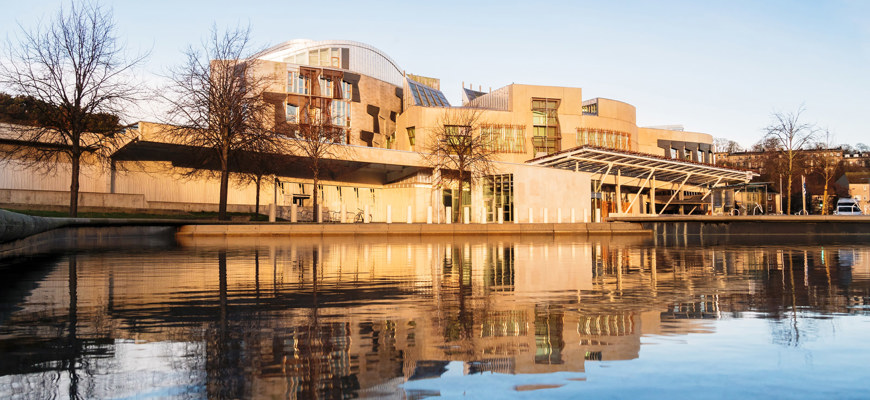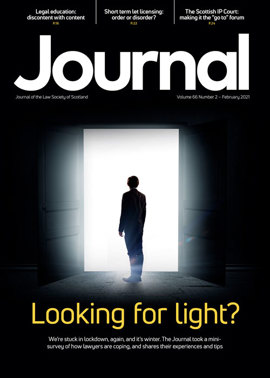Priorities for our Parliament

In 2020, the pandemic focused minds on the immediate challenges of our economy, working practices and lives being turned upside down. At the same time, our network of committee volunteers, staff and Council have been working on where we want our country to be in 2026 and beyond.
This month, we published the culmination of this work – our Priorities for the 2021 Scottish Parliament elections. This clear statement of intent demonstrates how we will focus our interactions with ministers and MSPs over the next five years. There are six key strands, but we open with one overarching principle – the importance of the rule of law and human rights.
Through our work as lawyers we dedicate our skills, experience and professionalism to protect and uphold people’s legal and human rights, ensuring those rights apply equally to all. In doing so, we are upholding the rule of law, a cornerstone of our society and democracy. We must be able to carry out this fundamental role without fear of intimidation or restrictions to our independence or impartiality.
As President I have made this point repeatedly and will continue to do so. The rule of law opens our priorities because I believe this, along with respecting and valuing our members who uphold it, should be utterly central in the minds of our lawmakers. Whatever controversies play out over the next five years, our political representatives must not only work within the rule of law, but defend, champion and celebrate it.
A momentous five years
It is astonishing to look back just five years to the last Holyrood elections. Since May 2016 we have seen three Prime Ministers, two UK general elections, and a vote to leave the EU followed by four years of Brexit negotiations. Then last year the pandemic led our Parliaments to introduce unprecedented emergency powers to restrict freedoms, to suppress transmission.
Yet while much has changed, much that we called for in 2016 returns with greater urgency in 2021. Despite reviews, consultations and extensive discussion, two central pillars of our 2016 priorities return: the need for progress on modern legal services regulation, and measures to protect access to justice.
I’m pleased to see that the issues I have worked to focus on as President will be central in our influencing work over the next five years, but disappointed that we have seen only very limited progress on legal aid in particular. As the realities of the pandemic hit home, I have seen legal aid solicitors in tears, fearful of the future and angry at a system which does not seem to care. This is a group of public servants who have long been forced to work more for less. The recent uplift in fees is welcome, but only a small step towards reforming the system and treating those working within it with the respect and value they deserve.
Diversity and opportunity
Another issue I have championed throughout my time on Council and as President is diversity within our profession. Scotland aims to be an inclusive and welcoming place, and its solicitors are increasingly diverse and representative of wider society. We can and should celebrate our progress, but we have a long way to go to truly reflect the society we serve.
There is more to do to advance equality of opportunity for all, and I want to see a career in law appeal to our young people, regardless of background. Initiatives like our StreetLaw programme and the Lawscot Foundation, which I know many of you have supported and contributed to, are helping to foster aspiration. Last year’s role models campaign highlighted that people from a variety of backgrounds already exist in the profession. Particularly among those with no lawyers in their families or social groups, these projects show that working in the law is a realistic aspiration for anyone with the intellect and graft to get there. Our priorities call for greater Government involvement to further this work, including through funding a legal apprenticeship route.
Of course, for entry places to the profession to continue to become available, we need to see growth in our economy and our legal sector. In the turbulent economic climate to come, Scotland has the skills and resources to succeed. We call for modern laws on moveable transactions and trusts; and press for Government backing for our exciting emerging legaltech sector and promotion of international trade and opportunities to expand legal services into global markets.
Our influencing work is more important than ever. Politicians want to hear from people living and working in their constituencies about the real changes they can deliver in office to benefit their communities. As the election campaign gets underway, I encourage all our members to read our priorities and consider contacting your local prospective MSPs to discuss how turning these aspirations into reality can drive real benefit for our citizens and businesses alike.
Respect for the rule of law: six themes
- Protecting access to justice
- Modernising regulation of legal services
- Boosting economic recovery
- Shaping Scotland’s legal and constitutional future
- Enhancing the diversity of the
legal profession - Driving public policy and law reform
Regulars
Perspectives
Features
Briefings
- Criminal court: Discount season
- Family: Capital values in uncertain times
- Employment: Can employers require staff vaccination?
- Human rights: Protecting the child claimant
- Pensions: a bill with teeth
- Charities: commerce as public benefit?
- Property: Playing safe: on the right track?
- In-house: Wide world of in-house
In practice
- Priorities for our Parliament
- The Word of Gold: The gift that keeps on giving
- TRS: more trusts, more information, more access
- A proper conclusion
- The Eternal Optimist: Putting resolve into resolutions
- Appreciation: Professor Emeritus Robert Rennie
- Ask Ash: Trainee in a rut
- Royal Faculty invites new members







